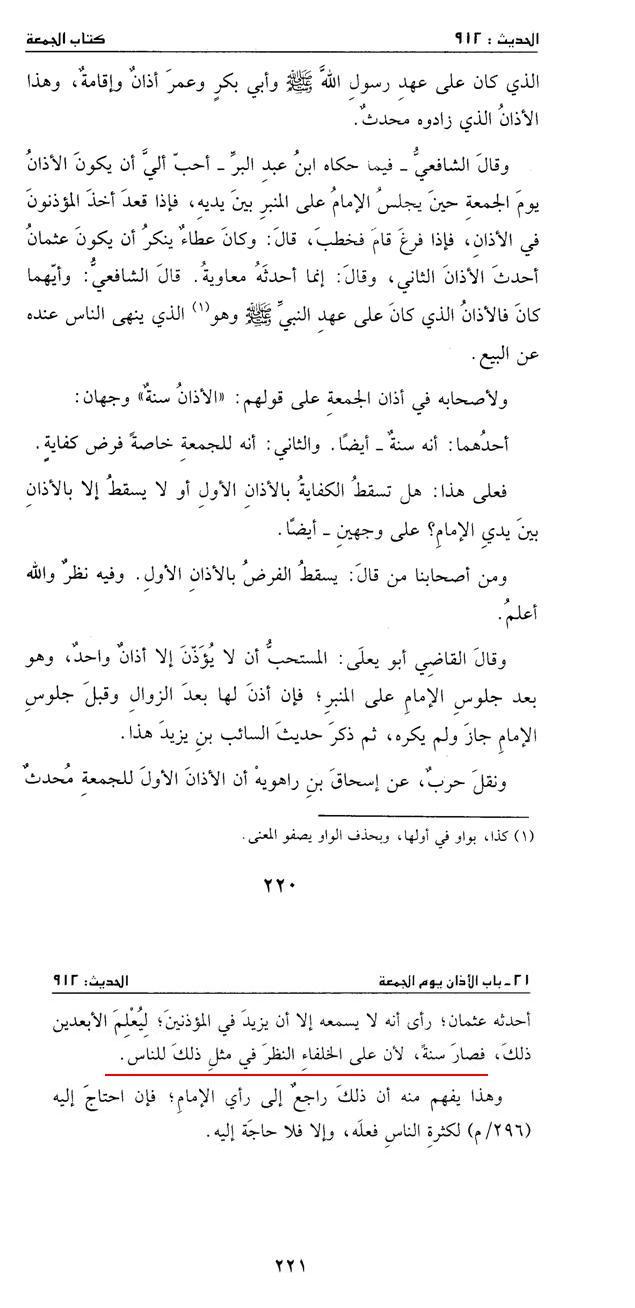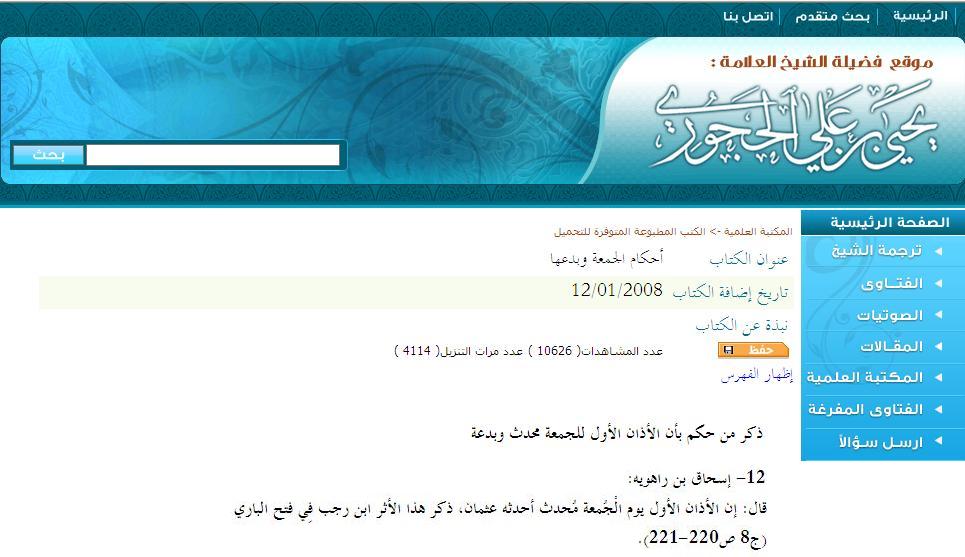
Tuesday, April 23 2013 - by Manhaj.Com
Read more articles at Manhaj.Com

Yahya al-Haddadi Clipping the Statements of the Imaams of the Salaf To Justify His Revilement Upon Uthmaan bin Affaan (radiallaahu anhu)
Yahya al-Haddadi has numerous revilements upon the Companions (radiallaahu anhum) - even the Messenger of Allaah (sallallaahu alayhi wasallam) has not been spared from his vile and obnoxious tongue - and an instance of that is ascribing bid'ah to Uthmaan (radiallaahu anhu) and declaring the action of Uthmaan (radiallaahu anhu) in adding a second aadhaan for Jumu'ah as being the "mother" for all subsequent innovations.
In the process of trying to justify this position, Yahya al-Haddadi clips the words of the Scholars, and an example of that is what he has done with a quote from Ishaaq bin Raahuyah, as cited by Ibn Rajab al-Hanbali in his explanation of Sahih al-Bukhari. Photo scans were posted online by Dr. Arafat al-Muhammadee, may Allaah reward him. Here is the book published online on his website, with the relevant citation (click to open):
Returning back to Fath al-Bari of Ibn Rajab al-Hanbali one finds the completion of the saying of Ishaq bin Rahuyah:

The citation of Yahya al-Haddaadi is as follows:
He (Ishaq) said: The first adhaan of the day of Jumu'ah is innovated, it is was innovated by Uthmaan, this athar was mentioned by Ibn Rajab in Fath al-Bari (8/220-221).
The full citation is as follows:
The first adhaan for Jumu'ah is introduced, it was introduced by Uthmaan. He saw that (the adhaan) will not be heard unless he increases the mu'adhdhins so that those furthest away will be informed (of time of Jumu'ah) and hence it became a Sunnah, because it is upon the Khulafaa to look into such matters for the (benefit of) the people.
Now a few important notes here:
ONE: Why have we translated Yahya al-Haddadi's citation with the word "innovated" and yet translated the actual citation with the word "introduced?" We have done so on the intent of each person. The intent of Yahya al-Haddadi is to ascribe actual "bid'ah" to Uthmaan (radiallaahu anhu) in the blameworthy sense, with the bid'ah condemned in the Shari'ah - so here we translated "muhdath" and "ahdatha" upon the intent of Yahya al-Haddaadi. The intent of Ishaq bin Rahuyah is to show that the Khulafaa are obliged to investigate and look into such matters for the benefit of the people and in this case, the affair that was introduced (i.e. with the linguistic meaning) became a Sunnah - this is upon the statement of the Messenger of Allaah (sallallaahu alayhi wasallam), "Upon you is my Sunnah and the Sunnah of my rightly-guided Khulafaa..." and in reality, in these types of matters, the Sunnahs of the Khulafaa is an extension of the Sunnah of the Messenger (sallallaahu alayhi wasallam). Hence, in order for justice to be done to the speech of each person, it has been translated upon the mashrab (orientation) of each person. This is what justice demands.TWO: In light of the first point then, Yahya al-Haddadi has two crimes, the crime of clipping the citation made by Ibn Rajab of the speech of Ishaq bin Rahuyah - this is academic dishonesty - and secondly the crime of ascribing to Ibn Rajab and Ishaq bin Rahuyah his own evil suspicion against Uthmaan (radiallaahu anhu).
THREE: This crime is not an isolated crime, we see that Yahyaa al-Haddaadi has taken the same approach and tact in some of his other criminal activities, such as the issue of accusing the Companions of participating in the murder of Uthmaan (radiallaahu anhu) where he tried to pass the buck to Scholars such as Ibn Katheer (see here, here, here and here) and also on the issue of accusing the Companions of originating the bid'ah of al-Irjaa which he tried to pass on to Ibn Taymiyyah (to come in another article inshaa'Allaah).
Related Articles:
- Yahya al-Hajuri And the Aqidah of the Jahmiyyah and Ash'ariyyah Regarding Negation of Wisdom From Allaah's Actions - Part 3
https://www.manhaj.com/manhaj/?cqctr
- Yahya al-Hajuri And the Aqidah of the Jahmiyyah and Ash'ariyyah Regarding Negation of Wisdom From Allaah's Actions - Part 2
https://www.manhaj.com/manhaj/?lhoee
- Yahya al-Hajuri And the Aqidah of the Jahmiyyah and Ash'ariyyah Regarding Negation of Wisdom From Allaah's Actions - Part 1
https://www.manhaj.com/manhaj/?qvchb
- Yahyaa al-Hajuri al-Haddaadi and Followers Firing Arrows Whilst Sinking in the Quicksand: The Issue of Istighaathah Revisited
https://www.manhaj.com/manhaj/?ipybg
- Shaykh Alee al-Hudhayfee: The Usool of Salafiyyah Opposed by Yahya al-Hajuri and His Followers - Part 2: Al-Hajuri's Oppression and Transgression Will Fall Back Upon Him
https://www.manhaj.com/manhaj/?qtatm
- Shaykh Alee al-Hudhayfee: The Usool of Salafiyyah Opposed by Yahya al-Hajuri and His Followers - Part 1: Al-Hajuri is Akhbath (Most Vile) of Diseased Souls in His Manhaj
https://www.manhaj.com/manhaj/?dzifv
- The Crimes of Yahya al-Haddadi in Matters of Knowledge and Belief: Clipping Citation of Ibn Rajab al-Hanbali Regarding Adhaan for Jumu'ah
https://www.manhaj.com/manhaj/?mxnee
- The Ghuluww Towards Yahyaa al-Haddaadi: Part 10 - Yahya al-Hajuri's Shining Brilliance Outweighs that of the Sun and Moon
https://www.manhaj.com/manhaj/?zzpwe
- The Ghuluww Towards Yahyaa al-Haddaadi: Part 9 - The Hajaawirah of London and His 'Highness' Yahya al-Hajuri Exemplifying the Musk of Paradise
https://www.manhaj.com/manhaj/?imbec
- The Ghuluww Towards Yahyaa al-Haddaadi: Part 8 - Put the Sun and Moon in the Hands of al-Hajuri
https://www.manhaj.com/manhaj/?duqsj
- Shaykh Ahmad Bazmul on Yahya al-Hajuri, His Transgressions and His Followers (the Hajaawirah Haddaadiyyah)
https://www.manhaj.com/manhaj/?jtltv
- Shaykh Ahmad Bazmul on Important Foundations of the Book and Sunnah (Which Oppose and Refute the Mumayyi'ah and Haddaadiyyah) - Part 5
https://www.manhaj.com/manhaj/?wtvjf
- Shaykh Ahmad Bazmul on Important Foundations of the Book and Sunnah (Which Oppose and Refute the Mumayyi'ah and Haddaadiyyah) - Part 4
https://www.manhaj.com/manhaj/?kfauu
- Shaykh Ahmad Bazmul on Important Foundations of the Book and Sunnah (Which Oppose and Refute the Mumayyi'ah and Haddaadiyyah) - Part 3
https://www.manhaj.com/manhaj/?aksda
- Shaykh Ahmad Bazmul on Important Foundations of the Book and Sunnah (Which Oppose and Refute the Mumayyi'ah and Haddaadiyyah) - Part 2
https://www.manhaj.com/manhaj/?uqrbd
- Shaykh Ahmad Bazmul on Important Foundations of the Book and Sunnah (Which Oppose and Refute the Mumayyi'ah and Haddaadiyyah) - Part 1
https://www.manhaj.com/manhaj/?eylta
- The Ghuluww Towards Yahyaa al-Haddaadi: Part 7 - Abandon al-Hajuri and Dammaj and the Deen of Allah on the Earth Has Been Abandoned!
https://www.manhaj.com/manhaj/?mhygy
- The Ghuluww Towards Yahyaa al-Haddadi: Part 6 - Yahya al-Haddadi Worshipped Besides Allaah With Istighaathah
https://www.manhaj.com/manhaj/?weerq
- The Ghuluww Towards Yahyaa al-Haddaadi: Part 5 - Who are al-Shafi'ee, Yahya bin Qattan, al-Khatib and Imaam Ahmad Compared to Yahyaa the 'Superstar'?
https://www.manhaj.com/manhaj/?rkwbk
- The Ghuluww Towards Yahyaa al-Haddaadi: Part 4 - If They Were to Melt Yahya al-Hajuri His Flesh Would Dissolve into the Book and the Sunnah!
https://www.manhaj.com/manhaj/?mdbmo
- The Ghuluww Towards Yahyaa al-Haddaadi: Part 3 - Yahya al-Haddadi, Gemini-Superstar, Has Gathered the Traits of the Prophet, the Companions, the Salaf and the Contemporary Scholars!
https://www.manhaj.com/manhaj/?gxpqv
- The Ghuluww Towards Yahyaa al-Haddaadi: Part 2 - People Flock to Dammaj As if it is Makkah and People Gather Around al-Hajuri as They Do the Ka'bah!
https://www.manhaj.com/manhaj/?mddzw
- The Ghuluww Towards Yahyaa al-Haddaadi: Part 1 - Shining al-Hajuri's Shoes For A Lifetime Amounts To Nothing Much!
https://www.manhaj.com/manhaj/?upjgs
- Shaykh Saalih al-Fawzaan Warns From the Likes of al-Hajuri Who Belittle the Messenger of Allaah and Show Boldness Towards Him
https://www.manhaj.com/manhaj/?gxhvf
- Shaykh al-Islaam Ibn Taymiyyah Demolishes the Basis of Yahyaa al-Haddaadi's Self-Defence in His Accusation that the Companions Participated in the Murder of Uthmaan
https://www.manhaj.com/manhaj/?bhbgz
- The Five Stages of Yahyaa al-Haddaadi in His Accusation Against Some of the Companions That They Participated in the Murder of Uthmaan
https://www.manhaj.com/manhaj/?mgwkm
- Yahyaa al-Hajuri Establishes Himself a Liar By Trying to Cover Up His Accusation that the Companions Participated in the Murder of Uthmaan
https://www.manhaj.com/manhaj/?taggg
- Yahya al-Hajuri Accuses the Sahabah of Participating in the Murder of the Khalifah Uthmaan
https://www.manhaj.com/manhaj/?cftvz
- Shaykh Saalih al-Fawzan Warns From Studying with the Likes of al-Hajuri Who Cause People to Doubt About Their Aqidah
https://www.manhaj.com/manhaj/?xbajs
- Shaykh Rabee' Bin Haadee Warns Against the Ghuluww and Haddaadiyyah of Yahya al-Hajuri and Followers
https://www.manhaj.com/manhaj/?dedtt
